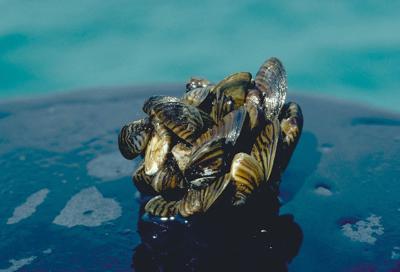Colorado Parks and Wildlife (CPW) has confirmed the presence of an extremely invasive zebra mussel in Highline Lake, at Highline Lake State Park.
"CPW found a single adult zebra mussel on a piece of substrate (PVC pipe) in the lake during routine invasive species sampling on Sept. 14. Two CPW experts have independently confirmed the identification of the mussel through visual identification methods and genetic confirmation was also made on the sample," CPW said in a news release.
This is the first time an adult zebra mussel has ever been found in Colorado waters.
In response, the department has since increased monitoring of Highline Lake for invasive mussels, CPW said. Prior to entering the lake, all boats will be subject inspection and decontamination protocols.
Boaters will also be issued a green seal and a blue receipt that indicates that their vehicle was last used on a body of water that has a known nuisance.
"If a boater leaving Highline Lake intends to launch in a different water body, their boat must be decontaminated before launching by a certified professional. Due to these additional constraints, boaters can expect decreased ramp hours and longer exit wait times for the remainder of the month. Highline Lake closes to all surface-water activities annually on October 1," the release said.
Zebra mussels are native to the Black, Caspian and Azov Seas of Eastern Europe, and were first discovered in the United States in 1988 in the Great Lakes. They have since spread to 33 states. Though small, the mussels can wreak havoc on entire habitats and cause hundreds of thousands of dollars in damage.
"Although this is very troubling, it's important to keep in mind that the lake is not considered infested, a designation given only to bodies of water that have extensive and reproducing adult populations," said CPW Invasive Species Program Manager Robert Walters.
"At this point, CPW has detected only a single invasive mussel at Highline. We will continue to monitor throughout the fall to get a more complete picture of the species’ presence in the reservoir.”
The potential negative impacts of zebra mussels, as provided by CPW, include:
- Prolific reproduction
- Clogged water infrastructure
- Ecological impacts
- Recreational impacts
- Economic impacts
- Social impacts
- Difficult or impossible to eradicate
- Quick spread to new water
"This is an unfortunate discovery, and something we have been working very hard to prevent," said CPW Acting Director Heather Dugan.
"It shows why we need a robust inspection program. As more and more people move to or visit Colorado and use our water resources for boating, we must continue to work hard to prevent the spread of these harmful invasive species. We cannot overstate how serious this is," she said.
STAY INFORMED: Sign-up for the daily OutThere Colorado newsletter here








(0) comments
Welcome to the discussion.
Log In
Keep it Clean. Please avoid obscene, vulgar, lewd, racist or sexually-oriented language.
PLEASE TURN OFF YOUR CAPS LOCK.
Don't Threaten. Threats of harming another person will not be tolerated.
Be Truthful. Don't knowingly lie about anyone or anything.
Be Nice. No racism, sexism or any sort of -ism that is degrading to another person.
Be Proactive. Use the 'Report' link on each comment to let us know of abusive posts.
Share with Us. We'd love to hear eyewitness accounts, the history behind an article.